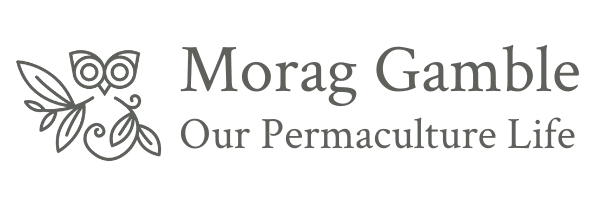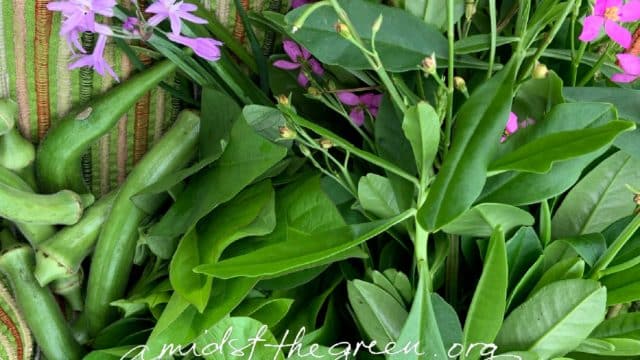Guest writer: Jo Anne V. Coruña – graduate of the Permaculture Educators Program writes about the education program she designed through the course – An Ecology of Changemaking that she launched with the Ashoka Foundation.
Amidst these times of quarantines and lockdowns, our forest garden has been a source of joy, wonder, relaxation, and hope for me and my family.

I can imagine that the same goes for many more people who have taken to the Earth and to growing their own food recently.
I know it is a gift, and in my part of the world, it is not lost on me that it is quite a privilege to have some land, however small, to tend to, to seek sanctuary in, to be able to divert attention from anxieties around the uncertainties that loom. Because of this, I often think about how I can share the abundance – not just harvests, but more so the mental, emotional, and spiritual yields – from our forest garden with more people. My background in social innovation as a former Ashoka staff member and my various experiences working with nonprofit organisations paved the way. As I was in our forest garden one morning, it dawned on me how Permaculture makes Systems Thinking a lot more tangible, and its impact quite immediately concrete. I’ve known about Systems Thinking for a long time, but it was different seeing it right before my eyes, through the ecosystem that I have helped build – and am actually a part of – in our piece of land. This was when the seed for the Ecology of Changemaking was sown. A program, a paradigm, and a mindset, the Ecology of Changemaking is an approach that integrates nature into the design of social initiatives and projects. It asks the question,
How might we make lasting positive change in collaboration with nature?
 This is a frog my very observant daughter saw in our forest garden one morning. Can we learn from it to make our changemaking better? I believe so.
This is a frog my very observant daughter saw in our forest garden one morning. Can we learn from it to make our changemaking better? I believe so.
Changemaking is the act of creating positive change in small and large contexts. All of us are capable of being changemakers in our families, schools, communities, and in the world. There are problems that call to us for solutions, and it’s been shown that the most effective way to address these concerns is through a systems thinking lens – by considering the whole environment where the problem persists, and not isolating it from everything else and just coming up with a band-aid solution. In designing a permaculture garden, with the ethics and principles as our guide, we look at patterns, we investigate our soil and the wild plants that grow in it, we study the history of the land, and we observe the various forces that affect our site such as the arc of the sun, the flow of water, and the direction and intensity of the wind. We consider the entire ecosystem before we start transplanting trees or sowing seeds, because if we don’t, then our efforts may come up short or in unfortunate cases, may actually do more harm than good. So it is with changemaking. And while it may be more complex to study the entire ecosystem of the problem we are trying to solve, systems thinking is a critical skill to hone and use as changemakers. Permaculture offers a pragmatic, tangible, and relevant method: Working with nature and learning from her ways and wisdom.
The Ecology of Changemaking mindset consciously situates the work that changemakers do in nature. Being humans, we are inevitably embedded in nature and her systems, and so is any work that we do. Continuing to separate our lives from nature can only lead to our own detriment. The Climate Crisis is real and we are feeling its effects, from this pandemic to “natural” disasters everywhere. If we are to work towards a better world, or zooming in closer to home, a better village or city or community, we have to embrace an Ecology of Changemaking approach. We have to collaborate with nature. We have to realise that we are a part of the vast and deep ecosystem of the natural world. We have to learn and honour the way indigenous peoples all over the world harmoniously co-exist with nature. I believe that knowing how to grow our own food must be a skill all of us must learn, just as how we are expected to learn how to read and write.
 Greens grown and harvested from our kitchen garden, clockwise from middle-left: Okra, Society Garlic, Talinum or Philippine Spinach, and Sweet Potato leaves. All on a sustainably woven fabric from ANTHILL Fabric Gallery a social enterprise in the Philippines that works to keep weaving traditions alive, while helping their partner communities have sustainable livelihood.
Greens grown and harvested from our kitchen garden, clockwise from middle-left: Okra, Society Garlic, Talinum or Philippine Spinach, and Sweet Potato leaves. All on a sustainably woven fabric from ANTHILL Fabric Gallery a social enterprise in the Philippines that works to keep weaving traditions alive, while helping their partner communities have sustainable livelihood.
With an Ecology of Changemaking mindset, we acknowledge that the solutions we wish to design and implement to address social problems will be more robust if it weaves the patterns, processes, and wisdom of nature through it. When we collaborate with nature and care for her in the process of doing our changemaking work, we address our own needs more holistically and regeneratively as well. I hope you’ll join me in this journey; I post regular updates about the program and my thoughts and reflections on its growth and evolution on my website.
Jo Anne VC is a visual artist, writer, and permaculture designer & practitioner. She is based in the Philippines with her husband and children, growing a food forest garden in their backyard. She co-hosts Tanum Tuesdays, a podcast featuring people and plants in the Philippines. You can find more of her writing, art, and permaculture field notes on amidstthegreen.org, and support her work and the Ecology of Changemaking program on Patreon.


